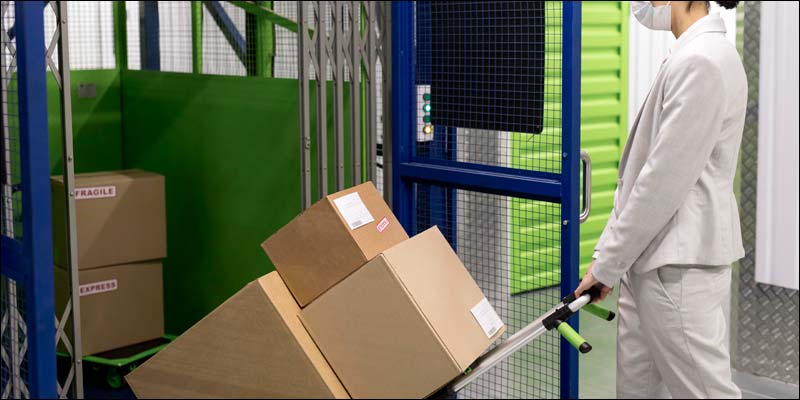Healthcare logistics is a vital component of the medical industry, ensuring the efficient and timely delivery of medical supplies, equipment, and pharmaceuticals to healthcare facilities and patients. In this blog, we will delve into the intricacies of healthcare logistics, exploring its challenges, technological advancements, transportation methods, regulatory compliance, and future trends.
What is Healthcare Logistics?

Healthcare logistics encompasses overseeing the movement of medical essentials like supplies, drugs, and devices from their production sites to healthcare centers and eventually to individuals in need. It extends to managing various healthcare-related materials such as lab samples, organs, and veterinary medicines.
Logistics plays a pivotal role in the healthcare sector by guaranteeing the timely and accurate delivery of essential items. This precision is crucial for maintaining quality patient care, as any delays or mistakes could disrupt treatment, escalate healthcare expenses, or jeopardize patient well-being.
Challenges in Healthcare Logistics
Supply Chain Complexities
Managing the supply chain in healthcare involves dealing with various stakeholders, including manufacturers, distributors, hospitals, and pharmacies. Coordinating these entities to ensure seamless delivery can be challenging, especially during times of crisis or high demand.
Temperature-Sensitive Shipments
Many medical products, such as vaccines, blood products, and certain medications, require strict temperature control during transportation to maintain their efficacy. Ensuring the integrity of these temperature-sensitive shipments adds another layer of complexity to healthcare logistics.
Regulatory Compliance
The healthcare industry is heavily regulated, with stringent requirements for the transportation and storage of medical products. Navigating these regulations, including FDA guidelines and Good Distribution Practices (GDP), is essential to avoid fines and ensure patient safety.
Technology in Healthcare Logistics
Tracking and Tracing Systems
Advanced tracking and tracing systems enable real-time monitoring of shipments, allowing logistics providers to identify potential issues and take corrective action promptly. This visibility helps improve efficiency and reduce the risk of product loss or theft.
RFID and IoT Applications
Radio-frequency identification (RFID) and Internet of Things (IoT) technologies are increasingly being used in healthcare logistics to track inventory, monitor environmental conditions, and automate processes. These innovations enhance visibility, accuracy, and efficiency throughout the supply chain.
Data Analytics for Efficiency
Harnessing the power of data analytics allows healthcare organizations to optimize their logistics operations by identifying trends, predicting demand, and streamlining workflows. By analyzing large datasets, companies can make informed decisions that drive cost savings and improve service levels.
Transportation in Healthcare Logistics
Specialized Vehicles and Equipment
Transporting medical supplies often requires specialized vehicles equipped with temperature control systems, GPS tracking, and security features. These vehicles ensure the safe and secure delivery of sensitive products, even in challenging environments.
Last-Mile Delivery Solutions
The last mile of delivery presents unique challenges in healthcare logistics, particularly in urban areas or remote locations. Leveraging innovative solutions such as drones, autonomous vehicles, and local distribution centers can help overcome these challenges and improve delivery efficiency.
Warehousing and Inventory Management
Efficient inventory management is crucial in healthcare logistics to minimize stockouts, reduce excess inventory, and ensure product availability when needed. Implementing inventory optimization techniques such as demand forecasting and just-in-time inventory can help streamline operations and reduce costs.
Automation technologies such as robotic picking systems, automated storage and retrieval systems (AS/RS), and autonomous guided vehicles (AGVs) are transforming warehouse operations in healthcare logistics. These technologies improve efficiency, accuracy, and safety, allowing organizations to meet growing demand while minimizing labor costs.
Cold Chain Management
Importance in Pharmaceuticals
Maintaining the integrity of the cold chain is essential for preserving the efficacy of temperature-sensitive pharmaceuticals, vaccines, and biologics. Proper cold chain management ensures that these products remain within specified temperature ranges throughout the supply chain, from manufacturing to patient administration.
Maintaining Temperature Control
Cold chain logistics relies on specialized packaging, refrigeration equipment, and temperature monitoring devices to maintain precise temperature control during transportation and storage. Continuous monitoring and temperature logging help identify any deviations and prevent product spoilage or loss.
Regulatory Compliance in Healthcare Logistics
FDA Regulations
The Food and Drug Administration (FDA) sets strict regulations for the transportation, storage, and handling of medical products to ensure patient safety and product quality. Compliance with FDA guidelines is essential for healthcare logistics providers to avoid regulatory penalties and maintain industry standards.
Good Distribution Practices (GDP)
Good Distribution Practices (GDP) are quality standards that govern the distribution of pharmaceutical products, ensuring their integrity and safety throughout the supply chain. Adhering to GDP guidelines requires implementing robust quality management systems, rigorous temperature control measures, and comprehensive documentation practices.
Patient-Centric Logistics
Home Healthcare Delivery
With the rise of home healthcare services, there is a growing need for patient-centric logistics solutions that deliver medical supplies and equipment directly to patients’ homes. Providing timely and reliable home delivery enhances patient convenience, improves adherence to treatment plans, and enhances overall patient satisfaction.
Patient Engagement and Satisfaction
Effective communication and engagement with patients are essential aspects of patient-centric logistics. Providing clear instructions, tracking updates, and personalized support can help alleviate anxiety, improve medication adherence, and foster trust between patients and healthcare providers.
Global Healthcare Logistics
International Shipping Challenges
International healthcare logistics involves navigating complex customs regulations, import/export restrictions, and transportation networks. Managing cross-border shipments requires careful coordination and compliance with international trade laws to ensure timely delivery and regulatory compliance.
Customs Clearance Procedures
Efficient customs clearance is critical in global healthcare logistics to prevent delays and ensure the smooth flow of goods across borders. Working with experienced customs brokers and leveraging electronic customs clearance systems can streamline the process and minimize the risk of shipment disruptions.
Sustainability in Healthcare Logistics
As environmental concerns become increasingly prominent, there is growing pressure on healthcare organizations to adopt sustainable practices in logistics operations. Implementing green initiatives such as energy-efficient transportation, eco-friendly packaging, and waste reduction strategies can help reduce the carbon footprint of healthcare logistics and support environmental sustainability.
Reducing the carbon footprint of healthcare logistics requires a multifaceted approach that addresses energy consumption, emissions, and waste generation throughout the supply chain. Embracing alternative fuel sources, optimizing transportation routes, and implementing recycling and reuse programs can significantly reduce environmental impact while lowering costs.
Future Trends in Healthcare Logistics
Telemedicine and Remote Monitoring
The rise of telemedicine and remote monitoring technologies is reshaping healthcare delivery, creating new opportunities and challenges for logistics providers. Delivering virtual care requires innovative logistics solutions that support remote consultations, home diagnostics, and digital health platforms while ensuring patient privacy and data security.
Drone and Autonomous Vehicle Delivery
The use of drones and autonomous vehicles for healthcare delivery is gaining traction, promising faster, more efficient, and cost-effective transportation of medical supplies and equipment. Deploying these technologies requires overcoming regulatory hurdles, addressing safety concerns, and integrating them into existing logistics networks to realize their full potential.
Healthcare Logistics Case Studies
Successful Implementations of Healthcare Logistics Solutions
Several organizations have successfully implemented innovative healthcare solutions to overcome challenges and improve patient care. Case studies highlighting these success stories demonstrate the impact of efficient logistics on cost savings, operational efficiency, and patient outcomes.
Benefits of Efficient Healthcare Logistics
Cost Savings
Efficient healthcare can result in significant cost savings for healthcare organizations by reducing transportation costs, minimizing inventory carrying costs, and streamlining supply chain operations. These savings can be reinvested in patient care, research, and infrastructure improvements, enhancing overall healthcare delivery.
Improved Patient Outcomes
By ensuring timely access to medical supplies, equipment, and medications, efficient logistics plays a crucial role in improving patient outcomes and quality of care. Timely delivery of critical resources reduces treatment delays, prevents complications, and enhances patient satisfaction, ultimately leading to better health outcomes.
Conclusion
In conclusion, healthcare logistics is a complex and essential component of the healthcare industry, ensuring the timely and efficient delivery of medical supplies, equipment, and pharmaceuticals to healthcare facilities and patients worldwide. By leveraging technology, optimizing transportation networks, and adhering to regulatory standards, healthcare organizations can overcome challenges and improve patient care while reducing costs and environmental impact.
FAQs
Q1. What is healthcare logistics?
Healthcare logistics ensures timely delivery of medical essentials, mirroring principles found in other industries but with higher stakes.
Q2. What does logistics mean in medical terms?
Medical logistics encompasses the handling of pharmaceuticals, medical and surgical supplies, medical devices and equipment, and other necessary products that aid doctors, nurses, and other healthcare and dental professionals in their practice.
Q3. What is the function of medical logistics?
The primary role of medical logistics begins with procurement, which entails obtaining essential medical supplies, equipment, and pharmaceuticals to fulfill healthcare needs. This process includes identifying dependable suppliers, negotiating contracts, and ensuring the prompt delivery of high-quality products.
Q4. What are the main challenges in healthcare?
Healthcare faces challenges such as supply chain complexities, temperature-sensitive shipments, and regulatory compliance requirements.
Q5. How does technology impact healthcare?
Technology enhances healthcare through advanced tracking systems, IoT applications, and data analytics, improving efficiency and visibility throughout the supply chain.
Q6. What is cold chain management, and why is it important?
Cold chain management involves maintaining temperature control during the transportation and storage of temperature-sensitive products, ensuring their efficacy and safety.
Q7. What role does regulatory compliance play in health logistics?
Ensuring regulatory compliance is crucial in health logistics. It’s necessary to maintain the safety and quality of medical products and to steer clear of fines and penalties.
Q8. How does efficient healthcare benefit patients?
Efficient healthcare ensures timely access to medical supplies and medications, improving patient outcomes, satisfaction, and overall quality of care.

